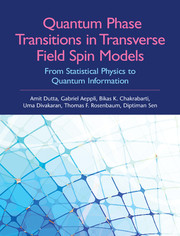 Quantum Phase Transitions in Transverse Field Spin Models
Quantum Phase Transitions in Transverse Field Spin Models Book contents
- Frontmatter
- Dedication
- Contents
- List of Figures and Tables
- Preface
- Acknowledgements
- I An Introduction to Quantum Phase Transitions, Information and Dynamics
- II Transverse Field Models: Statics
- III Transverse Field and Related Models: Non-Equilibrium Dynamics
- IV Experimental Realizations of Transverse Field Models
- V Quantum Annealing and Adiabatic Quantum Computations Using Transverse Field Models
- 15 Adiabatic Quantum Computations and Transverse Field Models
- 16 Concluding Comments
- Appendix A Derivation of a Matrix Product Hamiltonian
- Appendix B From Jordan–Wigner to Bosonization: Tomonaga–Luttinger Liquids
- Appendix C Calculation of the Entanglement Entropy for a Transverse Ising Chain
- Appendix D The Loschmidt Echo for the One-Dimensional XY Model
- Appendix E Landau–Zener Tunneling: Calculation of Non-Adiabatic Transition Probability
- Appendix F A Note on the Theoretical Studies of Hysteresis
- References
- Index
- Plate Section
16 - Concluding Comments
from V - Quantum Annealing and Adiabatic Quantum Computations Using Transverse Field Models
Published online by Cambridge University Press: 05 May 2015
- Frontmatter
- Dedication
- Contents
- List of Figures and Tables
- Preface
- Acknowledgements
- I An Introduction to Quantum Phase Transitions, Information and Dynamics
- II Transverse Field Models: Statics
- III Transverse Field and Related Models: Non-Equilibrium Dynamics
- IV Experimental Realizations of Transverse Field Models
- V Quantum Annealing and Adiabatic Quantum Computations Using Transverse Field Models
- 15 Adiabatic Quantum Computations and Transverse Field Models
- 16 Concluding Comments
- Appendix A Derivation of a Matrix Product Hamiltonian
- Appendix B From Jordan–Wigner to Bosonization: Tomonaga–Luttinger Liquids
- Appendix C Calculation of the Entanglement Entropy for a Transverse Ising Chain
- Appendix D The Loschmidt Echo for the One-Dimensional XY Model
- Appendix E Landau–Zener Tunneling: Calculation of Non-Adiabatic Transition Probability
- Appendix F A Note on the Theoretical Studies of Hysteresis
- References
- Index
- Plate Section
Summary
In this book, we have discussed quantum phase transitions in transverse field Ising and XY models in one and higher dimensions, particularly in the context of quantum information processing and non-equilibrium dynamics. We have illustrated how these models relate to actual quantum annealing protocols in physical systems and their connection to efficient quantum computation. Quantum phase transitions for pure models as well as for models with random interactions or random fields have also been considered. These models were introduced in the early 1960's in the context of order-disorder ferroelectric systems. This book focuses on the salient issues for which these models continue to be important and interesting even fifty years after their first appearance.
Our starting point involved generic theories of behavior of information theoretic measures, which were then illustrated using the transverse field models. Related models, e.g. those which are exactly soluble using Jordan-Wigner transformations and those exhibiting topological quantum phase transitions, were presented in the book at some length. These models are relevant to low-dimensional condensed matter physics as well as to quantum information and quantum dynamical studies.
On the theoretical side, the integrability of the transverse field Ising/XY models in one dimension has provided an ideal testing ground for field theoretical and information theoretical studies. Numerous predictions of theoretical studies have been verified experimentally in recent years. [180]. The one-dimensional version of these models have been extremely useful in studying information theoretic measures like concurrence, entanglement entropy, fidelity and fidelity susceptibility, and also the scaling of the defect density generated by quantum critical and multicritical quenches, namely, the Kibble–Zurek scaling. These models have played a crucial role in the development of quantum annealing techniques and adiabatic quantum algorithms. The equilibration or thermalization following quantum quenches have been studied using variants of transverse field models.
An advantageous feature of transverse field Ising models is the quantum-classical mapping which renders these models ideally suited for quantum Monte Carlo studies for d > 1.
- Type
- Chapter
- Information
- Quantum Phase Transitions in Transverse Field Spin ModelsFrom Statistical Physics to Quantum Information, pp. 265 - 266Publisher: Cambridge University PressPrint publication year: 2015


